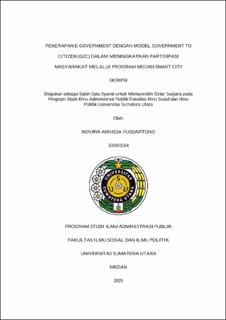| dc.description.abstract | The Medan Smart City programme through the Mercy application is designed as a centralised platform that collects various Medan City Government services, with the aim of making it easier for the public to access public services.
This research aims to analyse how the implementation of the Government to Citizen (G2C) e-government model through the Medan Smart City programme and provide recommendations for improvement and development of the Mercy application so
that it can be more optimal in supporting data disclosure and active community participation in accordance with the application of G2C e-government principles.
The research method used in this research is qualitative research. Data collection was carried out using interview techniques using purposive sampling, documentation, and observation with triangulation of data sources and techniques.
This research uses the e-government theory of the Government to Citizen model using success indicators from the Harvard JFK School of Government, namely support, capacity, and value. The results showed that strong government support
through the smart city masterplan and regulations, namely the Medan Mayor Regulation No. 28/2018 on Smart City in Medan City. Government capacity from the availability of resources that include funding from the APBD and information technology infrastructure is quite adequate. However, the availability of human resources is still limited. The value indicator in the form of benefits for the community still needs to be improved through comprehensive socialisation and introduction of the Mercy application. Although the Mercy application has shown a good foundation and the implementation of the Government to Citizen (G2C) model is running with strong policy support, strengthening is still needed in data management, technology
readiness, and government responsiveness. The researcher's recommendations include conducting a community needs survey, developing Standard Operating Procedures (SOPs) specific to the Mercy app, comprehensive socialisation, human
resources training, as well as improving communication and the active role of OPDs and leaders in promoting the app which is expected to improve the effectiveness, efficiency, and transparency of public services through the Mercy app, while strengthening Medan City's position as a responsive and inclusive smart city. | en_US |


